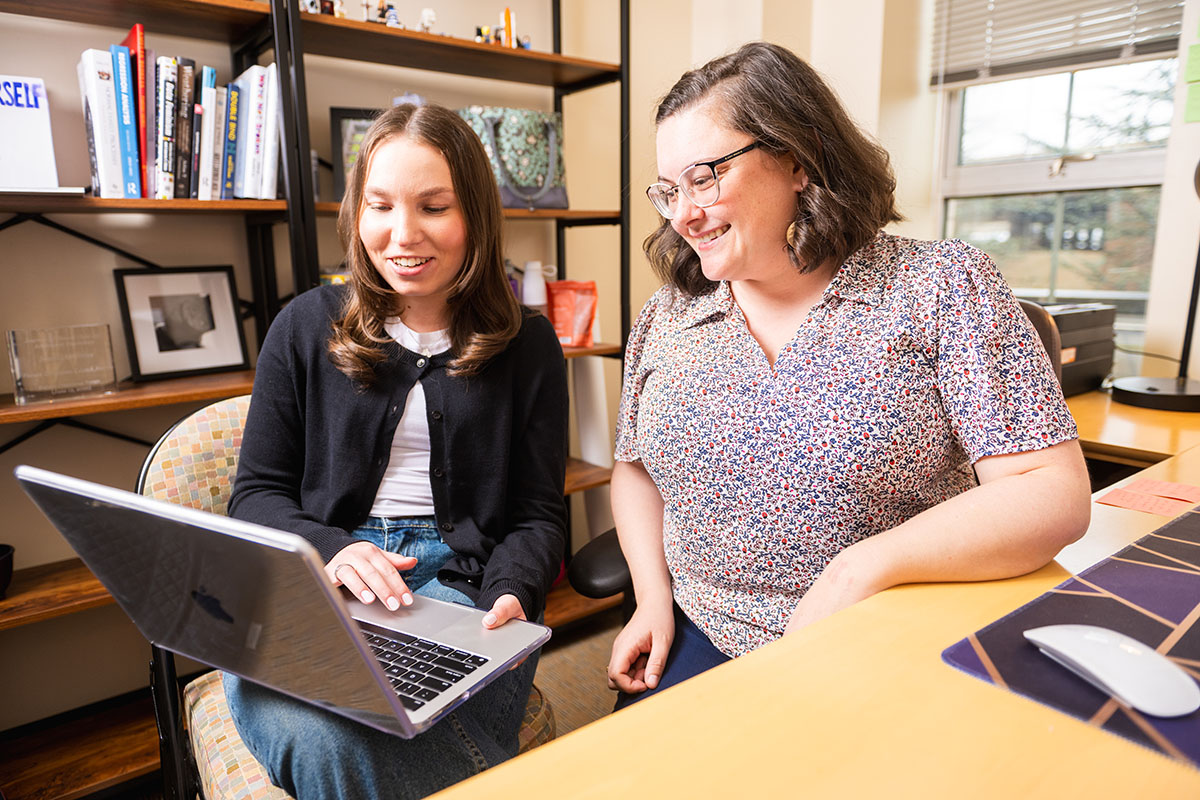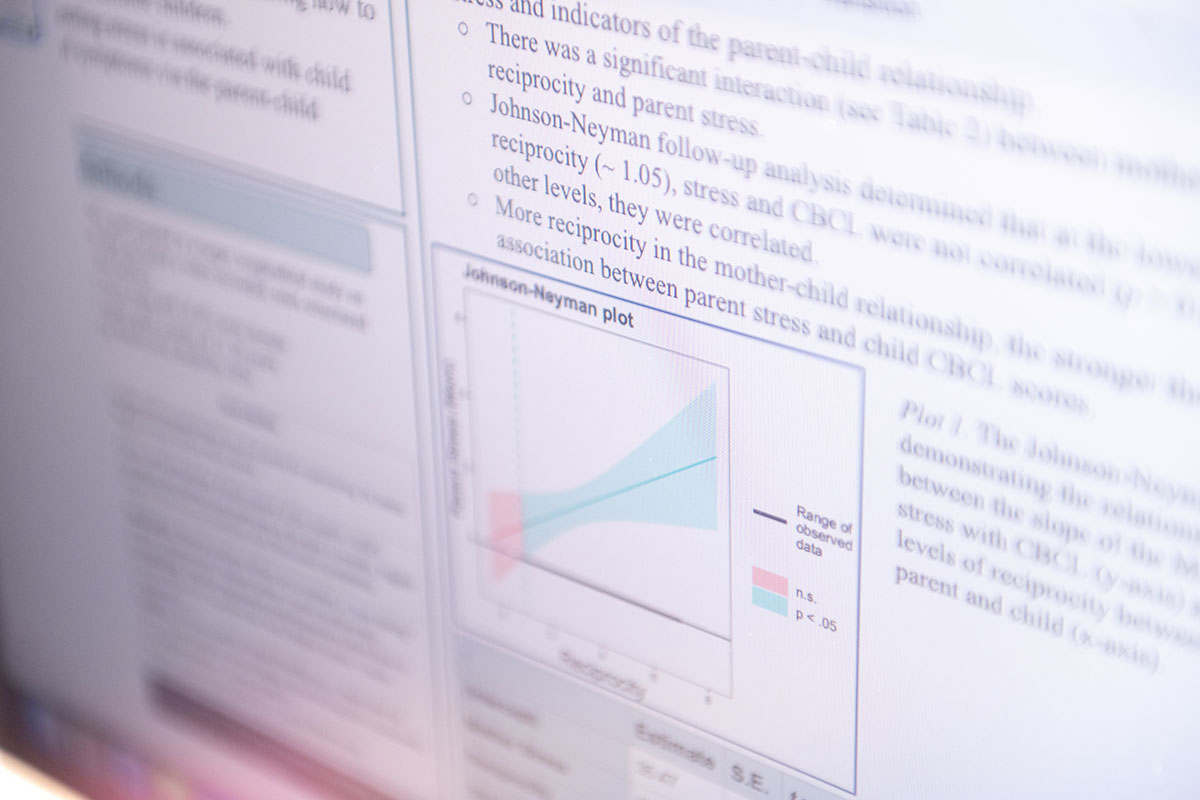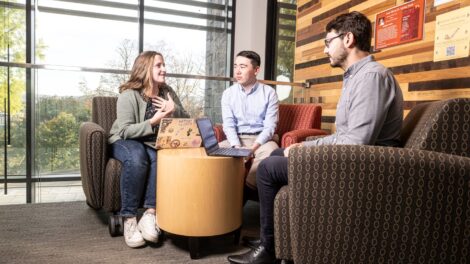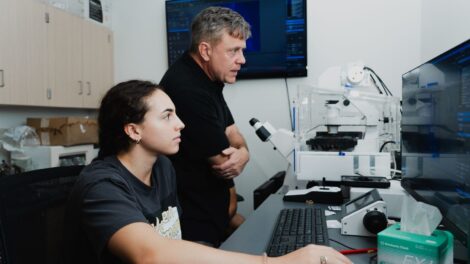Student-faculty neurodiversity research is a mentorship success story
By Margaret Wilson
In her Neurodiversity Lab, assistant professor of psychology Jessie Greenlee emphasizes preparing students for their future. But no matter their future goals, lab participants are offered the same overarching resource: mentorship.
For Alexa Raxenberg ’24, building a relationship with Greenlee was a driving force behind what is now meaningful research. The psychology major is completing her independent study on the impact of parent-child relationships on the mental health of autistic children in Greenlee’s lab.
Despite a lifelong interest in psychology and working with neurodiverse children, Raxenberg didn’t originally plan to pursue research at Lafayette. “I thought I was only really interested in the clinical realm of psychology,” she says. “I never thought that I would be interested in research. I didn’t even know what psychology research really entailed.”
Working closely with Lafayette’s psychology faculty to expand her horizons and explore new opportunities helped Raxenberg change her mind.
“Being able to take lab courses in the psychology department, which is not super common at other schools, allowed me to try and see if I liked [lab work],” Raxenberg says. After finding an interest in research, Raxenberg knew she wanted to join a lab—and Greenlee’s Neurodiversity Lab was the perfect place to find her focus.
Quickly, Raxenberg was able to form a mentor-mentee relationship with Greenlee, who helped Raxenberg shape her research project.

Alexa Raxenberg ’24 and Prof. Jessie Greenlee
“I expressed to Prof. Greenlee that I was interested in doing an independent study surrounding mental health and the parent-child relationship. She was a really great support in helping me narrow down my interests,” Raxenberg says. “What I really appreciate is the fact that Prof. Greenlee really wants us all to grow and find our own interests. She really gives us opportunities for collaboration in different ways.”
For her research, Raxenberg studied videotaped interactions between parents and their autistic children, which had previously been coded for behaviors like reciprocity, cooperation, and conflict. The study, a collaboration with University of Wisconsin at Madison, sought to understand how the parent-child relationship can help support the mental health needs of autistic children. She found that autistic children are sensitive to their caregivers’ stress, particularly in the context of positive mother-child relationships, a conclusion that diverges from previous research.
According to Greenlee, Raxenberg’s research is notable; developmental psychology historically does not take the approach of considering the family’s impact on autistic kids, especially through observational data.
“This really points to the fact that parents are important. What you do matters and what you do as a parent can help your autistic child,” Greenlee says. “That’s a pretty strong message, I think, that can be sent.”
The level of research that is able to contribute meaningfully to the field isn’t found at every undergraduate institution.
“Lafayette is this unique place where you get the liberal arts education, but then our psychology majors have access to productive researchers who are contributing to science, which means they get to do the same,” Greenlee says. “There’s a culture here where we welcome student ideas, and we want students to take risks with their independent studies.”
For Raxenberg, small class sizes and the individual attention they afford helped build a bond between her and her research adviser.
“I never had Prof. Greenlee before, and now I’ve taken three classes plus research, and we’ve become close,” Raxenberg says. “I’m just very grateful for a school like Lafayette, because I’ve been able to form a relationship with Prof. Greenlee as a mentor in such a short amount of time.”
“Alexa decided she wanted to do this research and just went for it,” Greenlee says. “She contacted me and said, ‘I want to be in your lab.’ And I said, ‘Alright. What do you need?’”
Raxenberg also credits Greenlee’s mentorship in helping her stand out in the job search. Presenting her findings at conferences and at the Pennsylvania State Capitol Building, Raxenberg gained the networking and presentation skills to shine amongst her peers. After graduation, Raxenberg will start a Post-Baccalaureate Intramural Research Training Award Fellowship at the National Institutes of Health, with the eventual goal of completing a doctoral program in clinical psychology.

“Mentorship at Lafayette was foundational in discovering my interests and reaching my goals,” Raxenberg says. “Working closely with faculty in the Psychology Department helped me pursue opportunities I wouldn’t have otherwise considered.”
While Raxenberg’s relationships at Lafayette have helped to secure her future after college, she doesn’t take it for granted. She’s currently paying it forward, acting as a psychology peer mentor for first-year students interested in psychology, mirroring support and advice she got in her job search from psychology program alumni in the field.
“My professor and parents told me, when I was receiving my mentorship, that I’m going to pay it forward and be that mentor for someone down the line,” Raxenberg says. “That’s something that stands out to me about Lafayette and its graduates—they’re always looking to be a supportive and helpful resource for others.”

